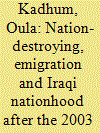|
|
|
Sort Order |
|
|
|
Items / Page
|
|
|
|
|
|
|
| Srl | Item |
| 1 |
ID:
164809


|
|
|
|
|
| Summary/Abstract |
While the literature has expounded diaspora’s involvement in homeland politics through lobbying efforts to influence hostland foreign policies, involvement in homeland conflicts and peace-building, this paper addresses a less-explored area in the diaspora literature related to the development of democracy through transnational civil society building. Using the case study of the Iraqi diaspora in Sweden, this paper assesses co-development projects financed by Sweden’s International Development Corporation Agency (SIDA) between Swedish institutional partners and Iraqi diaspora organizations from 2004 to 2008. Looking at both the perspective of the diaspora and public officials in Sweden, the paper problematizes the notion of diaspora as development partners and provides a nuanced understanding and new insights into the opportunities, challenges and limitations of diasporic initiatives aimed at supporting homeland civil society. Diaspora initiatives, it is argued, need to consider homeland security, understandings of development and goals, as well as homeland social and political contexts for exploring the opportunities and limitations of diasporic contributions. This is important for understanding both how and when diaspora’s involvement is to be supported, especially in conflict or post-conflict settings.
|
|
|
|
|
|
|
|
|
|
|
|
|
|
|
|
| 2 |
ID:
191722


|
|
|
|
|
| Summary/Abstract |
While emigration and population displacements have long been a feature of Iraqi history, this article argues that the 2003 Anglo-American intervention in Iraq and its legacy has contributed to the gradual disappearance of many non-Muslim Iraqi minorities from Iraq. Though the legacy of 2003 can be attributed to a confluence of domestic and geopolitical factors, it is argued here that the 2003 intervention set in motion a process of nation-destroying instead of nation-building, as Iraqi nationhood was divided along primordial lines. Caught between competing ethnic and sectarian nationalisms, Iraqi non-Muslim minorities became targets in the quest for territorial gain and political power heralding an unprecedented and steady level of emigration. This has changed the ethnic and religious demographic of Iraq, the identity of the Iraqi nation-state, as well as fragmented Iraq's multiple ethnic and religious nations both inside and outside the country. Indeed, the effects of nation-destroying have also been transported to the diaspora, strengthening communal identities, altering attachments and creating distance between Iraqi communities abroad. This has led to distanced transnational ethnic and religious Iraqi nations in diaspora who must now also contend with assimilation, a loss of culture and language in the absence of physical links to Iraq. The article offers the first comprehensive and scholarly treatment of the effects of emigration of Iraq's non-Muslim minorities on Iraqi nationhood within the new Iraqi nation-state. It therefore contributes conceptually and empirically to advancing our understanding of the role of nation-destroying and emigration in nationalizing processes, a neglected area in current migration and nationalism scholarship.
|
|
|
|
|
|
|
|
|
|
|
|
|
|
|
|
| 3 |
ID:
171187


|
|
|
|
|
| Summary/Abstract |
This article explores the role of religion in political transnationalism using the case of the Shi'a Iraqi diaspora since 2003. The article focuses on three areas that capture important trends in Shi'a transnationalism and their implications for transnational Shi'a identity politics. These include Shi'a diasporic politics, transnational Shi'a civic activism, and the cultural production of Iraqi Shi'a identity through pilgrimages, rituals and new practices. It is argued that understanding Shi'a Islam and identity formation requires adopting a transnational lens. The evolution of Shi'a Islam is not only a result of the dictates of the Shi'a clerical centres, and how they influence Shi'a populations abroad, but also the transnational interrelationships and links to holy shrine cities, Shi'i national and international politics, humanitarianism and commemorations and rituals. The article demonstrates that Shi'a political transnationalism is unexceptional in that it echoes much of the literature on diasporic politics and development where diaspora involve themselves from afar in the politics and societies of their countries of origin. At the same time, it shows the exceptionalism of Shi'a diasporic movements, in that their motivations and mobilizations are contributing to the reification of sectarian geographical and social borders, creating a transnationalism that is defined by largely Shi'a networks, spaces, actors and causes. The case of Shi'a political transnationalism towards Iraq shows that this is increasing the distance between Shi'is and Iraq's other communities, simultaneously fragmenting Iraq's national unity while deepening Shi'a identity and politics both nationally and supra-nationally.
|
|
|
|
|
|
|
|
|
|
|
|
|
|
|
|
|
|
|
|
|